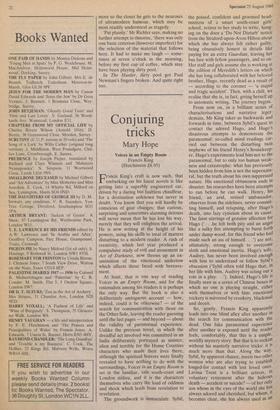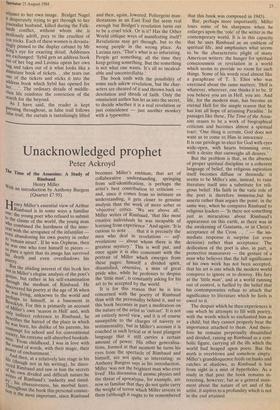Conjuring tricks
Mary Hope
Voices in an Empty Room Francis King (Hutchinson £8.95)
Frincis King's craft is now such, that embarking on his latest novels is like getting into a superbly engineered car, driven by a daring but faultless chauffeur, for a destination unknown but never in doubt. You know that you will hardly be conscious of gear changes; that curious, surprising and sometimes alarming detours will never mean that he has lost his way, merely that they will enlighten the arrival. He is now writing at the height of his powers, using his skills to treat of matters disturbing to a modern reader. A rush of creativity, which last year produced a compulsive study of evil and atonement in Act of Darkness, now throws up an ex- amination of the emotional undertow which affects those faced with bereave- ment.
At least, that is one way of reading Voices in an Empty Room, and for the rationalists among his readers it is perhaps the only way. But the book is also a deliberately ambiguous account — how, indeed, could it be otherwise? — of the search for communication with those on the Other Side, leaving the reader guessing until the last pages — and beyond — about the validity of paranormal experience. Unlike the previous novel, in which the dreadful act involved was committed in an India deliberately portrayed as sinister, alien and terrible for the Home Counties characters who made their lives there, although the spiritual horrors were finally revealed to have nothing to do with the surroundings, Voices in an Empty Room is set in the familiar, safe south-coast and London milieu, and it is the characters themselves who carry the load of oddness and shock which leads from revelation to revelation.
The groundwork is immaculate. Sybil,
the poised, confident and groomed head- mistress of a smart south-coast girls' school, retires to her study to write, hang- ing on the door a `Do Not Disturb' notice from the Straford-upon-Avon Hilton about which she has always felt rather guilty, being obsessively honest in details like paying for an extra Guardian, leaving her bus fare with fellow passengers, and so on. Her staff and girls assume she is working at the edition of Meredith's letters on which she has long collaborated with her beloved brother, Hugo, recently dead as a result of — according to the coroner — 'a stupid and tragic accident'. Then, with a chill, we realise that she is, in fact, giving herself up to automatic writing. The journey begins. From now on, in a brilliant series of characterisations and narrative leger- demain, Mr King takes us backwards and forwards in time, between Sybil's quest to contact the adored Hugo, and Hugo's disastrous attempts to demonstrate the paranormal: so-called mind readings car- ried out between the disturbing twin nephews of his friend Henry's housekeep- er. Hugo's experiments lead him not to the paranormal, but to only too human weak- ness and catastrophe: what has previously been hidden from him is not the supernatu- ral, but the truth about his own suppressed nature. His emotional obtuseness ends in disaster: his researches have been attempts to run before he can walk. Henry, his friend, an arid, retired ambassador, observes from the sidelines, never commit- ting himself, and relapsing, after Hugo's death, into lazy cynicism about its cause. The faint stirrings of genuine affection for Hugo ('. . .he felt both pity and an anger like a sulky fire attempting to burst forth under damp wood, for this friend who had made such an ass of himself. . .') are not, ultimately, strong enough to overcome sloth and emotional inertia. Hugo's wife, Audrey, has never been involved enough with him to understand or follow Sybil's obsession ('Sybil often told Hugo that, in her life with him, Audrey was acting out n role in a play. . .'). Indeed, Hugo's life .1s finally seen as a series of Chinese boxes in which no one is playing straight, either with themselves or with him: emotional trickery is mirrored by crookery, blackmail and deceit.
So, gently, Francis King apparently leads into one blind alley after another In the search for communication with the dead. One fake paranormal experience after another is exposed until the reader feels, comfortably, that this is a simple, worldly mystery story. But that is to reckon without his masterly narrative tricks: it is much more than that. Along the waY, Sybil, by apparent chance, meets two other women who are also trying to establish longed-for contact with lost loved ones. Lavina Trent is a brilliant actress, In voluntary retirement after the hideous death — accident or suicide? — of her only son whom in the eyes of the world she has always adored and cherished, but whom, it becomes clear, she has always used as an adjunct to her own image. Bridget Nagel is desperately trying to get through to her Journalist husband, killed during the Falk- lands conflict, without whom she is Perilously adrift, prey to the cruellest of con tricks. Each of these women is devasta- tingly pinned to the display cabinet by Mr King's eye for exacting detail. Addresses are exchanged: 'Sybil gets an address book out of her bag and Lavinia opens her own bag and takes out of it what looks like a Miniature book of tickets. . .she tears out One of the tickets and sticks it into the address book which Sybil has opened for her. ' The ordinary details of middle- class life reinforce the conviction of the search for the beyond.
As I have said, the reader is kept guessing throughout, as false trail follows false trail; the curtain is tantalisingly lifted and then, again, lowered. Poltergeist man- ifestations in an East End flat seem real enough but Bridget's revelation turns out to be a cruel trick. Or is it? Has the Other World oblique ways of manifesting itself? Revelations may get through, but to the wrong people in the wrong place. As Lavinia says, 'That's what is so infuriating. People get something; all the time they keep getting something. But the something is not what one wants. It's all so incalcul- able and uncontrollable.'
The book ends with the possibility of some such askew revelation, but the char- acters are cheated of it and thrown back on desolation and shreds of faith. Only the omniscient author has let us into the secret, to decide whether it is a real revelation or just coincidence — just another monkey with a typewriter.







































 Previous page
Previous page